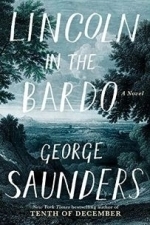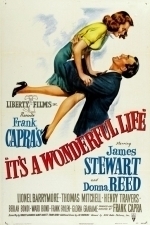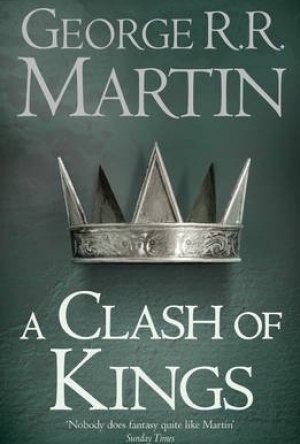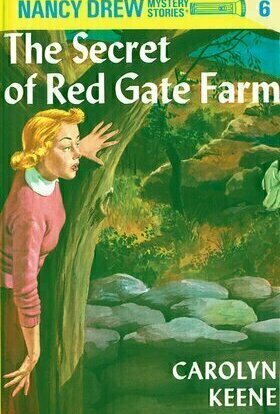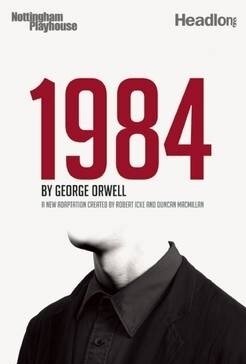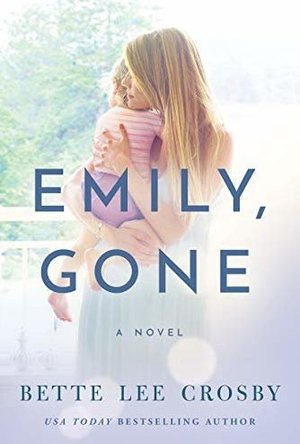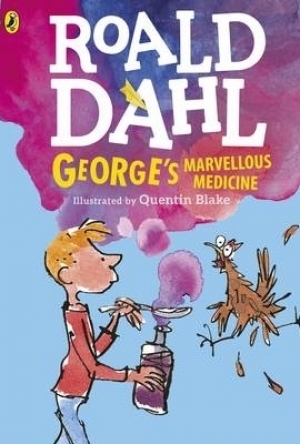Search
Search results
BookLover1980 (1 KP) rated A Game of Thrones in Books
Jan 14, 2018 (Updated Jan 14, 2018)
A world I want to live in
It took me 3 attempts to get in to this series but once I was past page 17 I was hooked.
Who doesn't want to get lost in a world of dragons and deceit, honour and family?
I can't wait to see how it ends... come on George, send us a raven!
Who doesn't want to get lost in a world of dragons and deceit, honour and family?
I can't wait to see how it ends... come on George, send us a raven!
BookCritics (259 KP) rated Lincoln in the Bardo in Books
May 16, 2017
Lincoln in the Bardo is an incredible first novel from a master of the short fiction format. The shared narration is reminiscent of a Greek chorus or a conversation, rendered on the page like the script of a play.
Critic- Melissa Ward
Original Score- 5 out of 5
Read Review: http://balletbookworm.blogspot.co.uk/2017/02/lincoln-in-bardo-by-george-saunders.html
Original Score- 5 out of 5
Read Review: http://balletbookworm.blogspot.co.uk/2017/02/lincoln-in-bardo-by-george-saunders.html
Emma @ The Movies (1786 KP) rated It's a Wonderful Life (1946) in Movies
Sep 25, 2019
After George Bailey wishes he had never been born, an angel is sent to earth to make his wish come true. George starts to realise how many lives he has changed and impacted, and how they would be different if he was never there.
This one is being shown as part of a classic Christmas line up at Cineworld. I like the idea of seeing some golden oldies on the screen, and I'm a little ashamed to admit that I have never seen this one. It really felt like I needed to fix that.
Is there anything more wonderful than an opening credit scene on an old movie? A printed book with a title page and all the actors listed out... I think not.
I'm not sure this will make it into my list of favourite Christmas movies, even though it was lovely. Old films do get me deep down, there's something so much more wonderful about them than some of the overly CGId modern films.
You've always got the great message of this film to fall back on too. You don't know how your life has impacted someone else. You shouldn't wish it away, you never know who it might impact in the future.
This one is being shown as part of a classic Christmas line up at Cineworld. I like the idea of seeing some golden oldies on the screen, and I'm a little ashamed to admit that I have never seen this one. It really felt like I needed to fix that.
Is there anything more wonderful than an opening credit scene on an old movie? A printed book with a title page and all the actors listed out... I think not.
I'm not sure this will make it into my list of favourite Christmas movies, even though it was lovely. Old films do get me deep down, there's something so much more wonderful about them than some of the overly CGId modern films.
You've always got the great message of this film to fall back on too. You don't know how your life has impacted someone else. You shouldn't wish it away, you never know who it might impact in the future.
Cyn Armistead (14 KP) rated A Clash of Kings (Reissue) in Books
Mar 1, 2018
The end of <i>A Clash of Kings</i> snuck up on me. That's something I hadn't really thought about before, especially with an 874 page monster like this, but it can happen with an ebook. I'm reading along, eager to know what happens next. The chapter ends, I go to the next page, and - <i>Appendix</i>? What do you mean, <i>Appendix</i>! That's nonsense, there's got to be more story here than that! I want to know what comes next, dammit! GIVE ME THE STORY!
As it happens, I can start reading [b:A Storm of Swords|62291|A Storm of Swords (A Song of Ice and Fire, #3)|George R.R. Martin|http://photo.goodreads.com/books/1298429990s/62291.jpg|1164465] whenever I like, unlike all those poor folk who read this book when it was first released. I think I might need to stop and read a few other books first, though. I did read today's big announcement regarding [b:A Dance with Dragons|2782553|A Dance with Dragons (A Song of Ice and Fire, #5)|George R.R. Martin|http://photo.goodreads.com/books/1301849720s/2782553.jpg|2936175], but there's no way I can stretch the next two volumes out to last through more than two months until book five actually comes out. I'm sure the delay will be worth it, though!
One thing [a:Sam Chupp|11847|Sam Chupp|http://photo.goodreads.com/authors/1219698183p2/11847.jpg] and I have discussed is Martin's marvelous subtlety with magic. It's only barely there at all throughout <i>A Game of Thrones</i>, and can easily be dismissed by anyone who doesn't have direct experience of it. It grows stronger in <i>A Clash of Kings</i>, but it is still something that just about anyone in the Seven Kingdoms would say belongs in tales for children. Not relying on magic for plot takes more discipline as an author, and holding back as he is says a great deal about Martin's careful pace.
As it happens, I can start reading [b:A Storm of Swords|62291|A Storm of Swords (A Song of Ice and Fire, #3)|George R.R. Martin|http://photo.goodreads.com/books/1298429990s/62291.jpg|1164465] whenever I like, unlike all those poor folk who read this book when it was first released. I think I might need to stop and read a few other books first, though. I did read today's big announcement regarding [b:A Dance with Dragons|2782553|A Dance with Dragons (A Song of Ice and Fire, #5)|George R.R. Martin|http://photo.goodreads.com/books/1301849720s/2782553.jpg|2936175], but there's no way I can stretch the next two volumes out to last through more than two months until book five actually comes out. I'm sure the delay will be worth it, though!
One thing [a:Sam Chupp|11847|Sam Chupp|http://photo.goodreads.com/authors/1219698183p2/11847.jpg] and I have discussed is Martin's marvelous subtlety with magic. It's only barely there at all throughout <i>A Game of Thrones</i>, and can easily be dismissed by anyone who doesn't have direct experience of it. It grows stronger in <i>A Clash of Kings</i>, but it is still something that just about anyone in the Seven Kingdoms would say belongs in tales for children. Not relying on magic for plot takes more discipline as an author, and holding back as he is says a great deal about Martin's careful pace.
Helping a Stranger on a Train
Nancy and her friends Bess and George are returning from a shopping trip when they meet Joanne on the train. She is heading to try to find a job to help her grandmother save her farm. The four quickly become friends, and Nancy gets involved in helping her find a job. However, several strange things happen to them along the way. Can Nancy figure out what is going on now?
When I pick up a Nancy Drew book, I expect coincidence to drive the plot a little. Here, there was so much of it early on that it was hard to overlook it. Fortunately, that lessened as the story moved forward. The story was still action packed and kept my attention. The characters are thin as always, but I still enjoyed spending some time with them again. Kids will probably more easily overlook both of these things. They might get confused by a few dated references, however, including using an old, now unacceptable, term for a minority. Still, I suspect they will enjoy this page turning story.
When I pick up a Nancy Drew book, I expect coincidence to drive the plot a little. Here, there was so much of it early on that it was hard to overlook it. Fortunately, that lessened as the story moved forward. The story was still action packed and kept my attention. The characters are thin as always, but I still enjoyed spending some time with them again. Kids will probably more easily overlook both of these things. They might get confused by a few dated references, however, including using an old, now unacceptable, term for a minority. Still, I suspect they will enjoy this page turning story.
Becs (244 KP) rated 1984 Nineteen Eighty-Four in Books
Oct 2, 2019
1984 by George Orwell, one of my favorite literary classic novels to this date! This was a monster to get through but once I finished, I was able to take the novel as a whole and learn from it. And man, what a loaded punch it throws at you. George Orwell is a favorite of mine and his writing style is just exactly what I expect from an author from his era.
1984 is about a government that controls everything a citizen of Oceania does, says, etc. If you rebel, you get kidnapped, tortured and then broken down to the point where they are able to rebuild you into the ideal citizen. That’s pretty much exactly what happens in this 328-page novel. But trust me when I say, this is worth a read through!
Genre: Sci-Fi, Dystopian, Literary Classic
Reading Level: High School +
Interests: Dystopian worlds, politics, science fiction, totalitarian systems.
Difficulty Reading: Like putting butter on a soft piece of bread. Not kidding, 1984 was difficult to read but the meaning behind it is what counts.
Promise: Dystopian, Sci-Fi world with a totalitarian system that runs your life until you are no longer a rebellious individual and instead under their complete control. A bit like being a slave.
Favorite Quotes: “Perhaps one did not want to be loved so much as to be understood.”
“Who controls the past controls the future. Who controls the present controls the past.”
“If you want a picture of the future, imagine a boot stamping on a human face—for ever.”
What Will You Gain: Knowledge on what the world could turn into when the government decides to rule over all a certain way. Where everything you do is controlled and if you do anything differently or that goes against what the government says, you end up dead.
Aesthetics: The entirety of the novel. The cover. How Orwell pretty much has the real world mixed in with a fantasy world. I mean, you just have to read it to know.
“The best books… are those that tell you what you know already.”
1984 is about a government that controls everything a citizen of Oceania does, says, etc. If you rebel, you get kidnapped, tortured and then broken down to the point where they are able to rebuild you into the ideal citizen. That’s pretty much exactly what happens in this 328-page novel. But trust me when I say, this is worth a read through!
Genre: Sci-Fi, Dystopian, Literary Classic
Reading Level: High School +
Interests: Dystopian worlds, politics, science fiction, totalitarian systems.
Difficulty Reading: Like putting butter on a soft piece of bread. Not kidding, 1984 was difficult to read but the meaning behind it is what counts.
Promise: Dystopian, Sci-Fi world with a totalitarian system that runs your life until you are no longer a rebellious individual and instead under their complete control. A bit like being a slave.
Favorite Quotes: “Perhaps one did not want to be loved so much as to be understood.”
“Who controls the past controls the future. Who controls the present controls the past.”
“If you want a picture of the future, imagine a boot stamping on a human face—for ever.”
What Will You Gain: Knowledge on what the world could turn into when the government decides to rule over all a certain way. Where everything you do is controlled and if you do anything differently or that goes against what the government says, you end up dead.
Aesthetics: The entirety of the novel. The cover. How Orwell pretty much has the real world mixed in with a fantasy world. I mean, you just have to read it to know.
“The best books… are those that tell you what you know already.”
Heather Cranmer (2721 KP) rated Emily, Gone in Books
Jun 7, 2019
I have been a fan of author Bette Lee Crosby since reading her book The Summer of New Beginnings. When I heard of her latest book, Emily, Gone, I knew I would have to read it sooner rather than later. Miss Crosby did not disappoint at all with this one.
Six month old Emily's parents are beyond exhausted due to a music festival very close to their house during 1971. After laying Emily down in her crib in her room, Emily's parents, Rachel and George Dixon, go to their room and finally have a good night's sleep. In the morning when Rachel checks on baby Emily, she is missing from her crib. Vicki gave birth to a stillborn baby girl about a month before Emily was born. When Vicki and her boyfriend decide to stop at a random house to get some food after the festival late one night, it's the perfect opportunity for her to steal baby Emily. What follows is a years long search for Emily all the while Emily is being raised by Vicki and her family. Will Rachel and George ever be united with their Emily?
I enjoyed the plot for Emily, Gone immensely. There are no plot holes or cliffhangers, and Bette Lee Crosby writes about 1971 and the subsequent years very well. It's as if I was transported back in time to that era. Everything flows together smoothly. I found myself wanting Rachel and George to be reunited with Emily quickly, but that wasn't the case. Back in 1971, things like the internet and Amber Alerts weren't a thing, so as frustrating as it was, I could see how hard it would be to recover a kidnapped child. I wish the story would have involved Murph, Vicki's boyfriend, a bit more. He's in the story for about halfway and that's about it. I would have liked to know about him in the epilogue at least. Also, I did find the ending a bit far fetched albeit it probable. It just seems like it would have been highly unlikely. Bette Lee Crosby does touch on the Christian faith lightly throughout this book which could explain the ending.
I found the characters in Emily, Gone to be written superbly. All of them were fleshed out enough to feel like a real person instead of a character in a book. My heart went out to Rachel throughout the years without her Emily. George, Emily's father, had better coping mechanisms, but I still felt bad to him. I can't imagine, and I don't even want to imagine what it would be like if someone kidnapped one of my kids. Mama Dixon was my favorite character in the book. I loved what a warm presence she was throughout the novel to her family. I felt like she was part of my family as well! Although Vicki was written well, I just did not like her. I found her to be very selfish, and I suppose that's because she was mentally ill after the stillborn birth of her baby girl. I kept silently pleading with her to do the right thing and return Emily. I kept wanting her to get caught so she could get the help she needed and the Dixons could have their baby back. I liked Murph, Vicki's boyfriend, but I wish he would have done the right thing and told someone what Vicki had done. In a way, I understand why he didn't turn Vicki in, but it would have been better for everyone in the long run. In a way, my heart also went out to Angela and Kenny for being pulled into Vicki's mess. They were also completely innocent of everything.
I found the pacing to be perfect from the very first page to the very last page. Every time I had to stop reading Emily, Gone I felt like I was leaving a long lost friend, and I couldn't wait to return.
Trigger warnings for Emily, Gone include some drug references, kidnapping, stillborn birth, mental illness, death, some alcohol use, slight references to child molestation, incest, and other sexual references (such as couples making love, nothing graphic).
Overall, Emily, Gone is a highly interesting read with an entertaining plot that will hold you tight and not let go of you until you're done reading! This is one of those stories that will tug at your heartstrings. I would definitely recommend Emily, Gone by Bette Lee Crosby to everyone aged 17+ who would love a fantastically written emotional story.
Six month old Emily's parents are beyond exhausted due to a music festival very close to their house during 1971. After laying Emily down in her crib in her room, Emily's parents, Rachel and George Dixon, go to their room and finally have a good night's sleep. In the morning when Rachel checks on baby Emily, she is missing from her crib. Vicki gave birth to a stillborn baby girl about a month before Emily was born. When Vicki and her boyfriend decide to stop at a random house to get some food after the festival late one night, it's the perfect opportunity for her to steal baby Emily. What follows is a years long search for Emily all the while Emily is being raised by Vicki and her family. Will Rachel and George ever be united with their Emily?
I enjoyed the plot for Emily, Gone immensely. There are no plot holes or cliffhangers, and Bette Lee Crosby writes about 1971 and the subsequent years very well. It's as if I was transported back in time to that era. Everything flows together smoothly. I found myself wanting Rachel and George to be reunited with Emily quickly, but that wasn't the case. Back in 1971, things like the internet and Amber Alerts weren't a thing, so as frustrating as it was, I could see how hard it would be to recover a kidnapped child. I wish the story would have involved Murph, Vicki's boyfriend, a bit more. He's in the story for about halfway and that's about it. I would have liked to know about him in the epilogue at least. Also, I did find the ending a bit far fetched albeit it probable. It just seems like it would have been highly unlikely. Bette Lee Crosby does touch on the Christian faith lightly throughout this book which could explain the ending.
I found the characters in Emily, Gone to be written superbly. All of them were fleshed out enough to feel like a real person instead of a character in a book. My heart went out to Rachel throughout the years without her Emily. George, Emily's father, had better coping mechanisms, but I still felt bad to him. I can't imagine, and I don't even want to imagine what it would be like if someone kidnapped one of my kids. Mama Dixon was my favorite character in the book. I loved what a warm presence she was throughout the novel to her family. I felt like she was part of my family as well! Although Vicki was written well, I just did not like her. I found her to be very selfish, and I suppose that's because she was mentally ill after the stillborn birth of her baby girl. I kept silently pleading with her to do the right thing and return Emily. I kept wanting her to get caught so she could get the help she needed and the Dixons could have their baby back. I liked Murph, Vicki's boyfriend, but I wish he would have done the right thing and told someone what Vicki had done. In a way, I understand why he didn't turn Vicki in, but it would have been better for everyone in the long run. In a way, my heart also went out to Angela and Kenny for being pulled into Vicki's mess. They were also completely innocent of everything.
I found the pacing to be perfect from the very first page to the very last page. Every time I had to stop reading Emily, Gone I felt like I was leaving a long lost friend, and I couldn't wait to return.
Trigger warnings for Emily, Gone include some drug references, kidnapping, stillborn birth, mental illness, death, some alcohol use, slight references to child molestation, incest, and other sexual references (such as couples making love, nothing graphic).
Overall, Emily, Gone is a highly interesting read with an entertaining plot that will hold you tight and not let go of you until you're done reading! This is one of those stories that will tug at your heartstrings. I would definitely recommend Emily, Gone by Bette Lee Crosby to everyone aged 17+ who would love a fantastically written emotional story.
Kayleigh (12 KP) rated George's Marvellous Medicine in Books
Jan 2, 2019
This was always my favourite Roald Dahl book, and I’ve re-remembered why now! It’s deliciously naughty, and everybody can imagine gleefully mixing up a concoction to make a disliked person yell “Oweeeee!”
A couple of years ago, I was an au pair in France for three children: a boy aged 9 and two girls, aged 5 years and 9 months old, respectively. I remember I had a little bit of trouble getting the children to settle down and listen to me reading a book, and alas, with the girls, I wasn’t actually successful. They were really intelligent kids, speaking French and German, with English as their third language. With the boy though – I’ll call him L, as I haven’t asked permission to use his name – he ended up loving this book. While there were some words I thought it necessary to replace so that he’d understand, he got really into it, and every day was asking me to read him another chapter.
It’s all slightly cheeky, and very funny. There have certainly been people over the years I’d love to make a magical medicine for, and I remember L getting more and more excited as he firstly wondered what was going to happen to Grandma, and then was fascinated by all the effects the medicine had.
There’s a real childish logic to how George goes about concocting his marvellous medicine, which I know appeals to many kids. She’s got rotten teeth, so he’ll put toothpaste in, and if that doesn’t work, he’ll paint them red with nail varnish. Genius! Here’s one of his ideas:
<blockquote>“The first one he took down was a large box of SUPERWHITE FOR AUTOMATIC WASHING-MACHINES. DIRT, it said, WILL DISAPPEAR LIKE MAGIC. George didn’t know whether Grandma was automatic or not, but she was certainly a dirty old woman.”</blockquote>
Quentin Blake’s illustrations really add to the story, particularly in the second half of the book, when the child reading it can see just how big the characters are getting.
The imagination is powerful, but even more so when mixed with these visual aids – see the picture to the right. I think the great thing about the detail of these illustrations – particularly Grandma’s face – is that you can project feelings onto them. In the context of the story it’s really easy to see her as a disgusting “old bird”, but if it was slightly different, judging from the front page you could see her as slightly mischievous too. Or is that just me?! However, I’m digressing. For an adult reading the book, the words dance off the tongue just like George, imagining he’s casting a spell over his cauldron. I found that L’s attention was thoroughly captured and he loved hearing the ‘special effects’ of all the whooshes and woweeees. There’s also the magical and triumphant aspects – he’s somehow created this cool concoction that has meant he’s got his own back on his grouchy old Grandma and helped out his dad by enlarging all the animals. I think kids love those feeling of pride and revenge they get on George’s behalf, while at the same time getting vivid images in their head that they’ll remember for a long time – I know I did!
This review is also on my <a href="http://awowords.wordpress.com">blog</a>; - if you liked it, please check it out!
A couple of years ago, I was an au pair in France for three children: a boy aged 9 and two girls, aged 5 years and 9 months old, respectively. I remember I had a little bit of trouble getting the children to settle down and listen to me reading a book, and alas, with the girls, I wasn’t actually successful. They were really intelligent kids, speaking French and German, with English as their third language. With the boy though – I’ll call him L, as I haven’t asked permission to use his name – he ended up loving this book. While there were some words I thought it necessary to replace so that he’d understand, he got really into it, and every day was asking me to read him another chapter.
It’s all slightly cheeky, and very funny. There have certainly been people over the years I’d love to make a magical medicine for, and I remember L getting more and more excited as he firstly wondered what was going to happen to Grandma, and then was fascinated by all the effects the medicine had.
There’s a real childish logic to how George goes about concocting his marvellous medicine, which I know appeals to many kids. She’s got rotten teeth, so he’ll put toothpaste in, and if that doesn’t work, he’ll paint them red with nail varnish. Genius! Here’s one of his ideas:
<blockquote>“The first one he took down was a large box of SUPERWHITE FOR AUTOMATIC WASHING-MACHINES. DIRT, it said, WILL DISAPPEAR LIKE MAGIC. George didn’t know whether Grandma was automatic or not, but she was certainly a dirty old woman.”</blockquote>
Quentin Blake’s illustrations really add to the story, particularly in the second half of the book, when the child reading it can see just how big the characters are getting.
The imagination is powerful, but even more so when mixed with these visual aids – see the picture to the right. I think the great thing about the detail of these illustrations – particularly Grandma’s face – is that you can project feelings onto them. In the context of the story it’s really easy to see her as a disgusting “old bird”, but if it was slightly different, judging from the front page you could see her as slightly mischievous too. Or is that just me?! However, I’m digressing. For an adult reading the book, the words dance off the tongue just like George, imagining he’s casting a spell over his cauldron. I found that L’s attention was thoroughly captured and he loved hearing the ‘special effects’ of all the whooshes and woweeees. There’s also the magical and triumphant aspects – he’s somehow created this cool concoction that has meant he’s got his own back on his grouchy old Grandma and helped out his dad by enlarging all the animals. I think kids love those feeling of pride and revenge they get on George’s behalf, while at the same time getting vivid images in their head that they’ll remember for a long time – I know I did!
This review is also on my <a href="http://awowords.wordpress.com">blog</a>; - if you liked it, please check it out!
Deborah (162 KP) rated Richard III: The King in the Car Park in Books
Dec 21, 2018
I quote from the final page of this publication: "The writer of this book will face similar virulent criticism. It will be savaged in the book reviews on Amazon, mainly by non-readers, to take its ratings and thus popularity down." In fact, this is the last, but by no means the only rant by the author who appears to have a definite chip on his shoulder for some reason. Since he subjects Thomas Penn's work, 'The Winter King' to such virulent criticism, one can only suspect that he was turned down by Penn's publisher. One can hardly be surprised. I have read this book, despite wanting on a number of occasions to give up in disgust. It is full of errors of spelling (e.g. youngest for younger, now instead of not), so has evidently not had either a proof reader or an editor. There are also many factual errors with names and titles becoming hopelessly confused. On one page we're told that Sir James Tyrell was hanged and a couple of pages later we're told that Henry Tudor was so kind as to merely condescend to cut his head off!
I will admit that with pro-Ricardian sympathies I was probably never going to like this book, but it is a bit of a mess and feels like another case of jumping on the bandwagon. There is no index, no footnotes/endnotes and only a partial list of sources, which is enough to raise questions about academic rigour. If you are going to publish opinions, particular in The Great Debate, these really should be backed up by factual evidence. I think I am most irked by the hypocrisy of Mr Breverton telling us at one point that he is going to take a fresh impartial look at the subject and then immediately showing us exactly which colour he prefers his roses.
His list, near the back of the volume, of all the 'crimes' he thinks Richard III was guilty of really does teeter on the brink of blindness and absurdity. Apparently he is guilty in the case of the Earl of Warwick, son of Richard's older brother, George of Clarence, but whose claim to the throne was barred by his father's attainder (always reversible, but Warwick was then only a child of about 8 years). I'm pretty sure this Warwick was sent to Sheriff Hutton Castle to be brought up with other young persons, as befitted his status by Richard. Of course, as soon as Henry Tudor usurped the throne, this boy was locked up in the Tower only to be executed later on a trumped up charge. I think I know who the guilty party is in that case.
That is my frank opinion on this volume; I will now expect said author to savage me as he has everyone else on Amazon who has pointed out the self-evident shortcomings in this work.
I will admit that with pro-Ricardian sympathies I was probably never going to like this book, but it is a bit of a mess and feels like another case of jumping on the bandwagon. There is no index, no footnotes/endnotes and only a partial list of sources, which is enough to raise questions about academic rigour. If you are going to publish opinions, particular in The Great Debate, these really should be backed up by factual evidence. I think I am most irked by the hypocrisy of Mr Breverton telling us at one point that he is going to take a fresh impartial look at the subject and then immediately showing us exactly which colour he prefers his roses.
His list, near the back of the volume, of all the 'crimes' he thinks Richard III was guilty of really does teeter on the brink of blindness and absurdity. Apparently he is guilty in the case of the Earl of Warwick, son of Richard's older brother, George of Clarence, but whose claim to the throne was barred by his father's attainder (always reversible, but Warwick was then only a child of about 8 years). I'm pretty sure this Warwick was sent to Sheriff Hutton Castle to be brought up with other young persons, as befitted his status by Richard. Of course, as soon as Henry Tudor usurped the throne, this boy was locked up in the Tower only to be executed later on a trumped up charge. I think I know who the guilty party is in that case.
That is my frank opinion on this volume; I will now expect said author to savage me as he has everyone else on Amazon who has pointed out the self-evident shortcomings in this work.
Rachel King (13 KP) rated Letters to Ethan: A Grandfather's Legacy of Life & Love in Books
Feb 11, 2019
Right from the beginning, I found the seriousness to which the author, Tom McQueen, approaches his role as a grandfather to his grandson, Ethan, as both endearing and worthy of my respect. What he is attempting to do with the letters found in this book is a commendable goal that not many grandparents may go through the trouble to achieve. Each "chapter" of the book is actually a four-to-six page letter and headed by a quotation that applies to the topic of the letter. Each of the letters address a specific topic, such as Heroism, Risk, Integrity, Love, and Imagination, to name a few. Some of the letters also include excerpts from other sources that McQueen finds wisdom in, such as poetry or short stories like the famous story "Footprints in the Sand." Many of the letters make references to sports and sports imagery, such as citing Wayne Gretsky's accomplishments, which is certainly appropriate for most boys. The letters are also peppered with poignant memories of McQueen's and bits of history, such as the story of George Washington Carver.
It becomes apparent in the first letter that this book has a decidedly Roman Catholic slant, and many of the letters include Catholic doctrine teachings. If the reader does not prescribe to Roman Catholicism, this can be a major obstacle to enjoying this book. The other thing that bugs me throughout the text is that I can not figure out at what age the author intended his grandson to read these letters. Some of the topics are rather mature, and they would not be appropriate for a boy that is too young to receive the advice given in the letter, no matter how well-meaning it is. I also could not decipher if McQueen's grandson, Ethan, was supposed to read these letters while his grandfather was still alive or if they were meant for after he passed - again, this would make sense if the appropriate age were given for each letter.
If I ignore the obvious bias in the letters, I found much of the advice given to be relevant and useful wisdom for a young man - or woman - attaining to adulthood.
It becomes apparent in the first letter that this book has a decidedly Roman Catholic slant, and many of the letters include Catholic doctrine teachings. If the reader does not prescribe to Roman Catholicism, this can be a major obstacle to enjoying this book. The other thing that bugs me throughout the text is that I can not figure out at what age the author intended his grandson to read these letters. Some of the topics are rather mature, and they would not be appropriate for a boy that is too young to receive the advice given in the letter, no matter how well-meaning it is. I also could not decipher if McQueen's grandson, Ethan, was supposed to read these letters while his grandfather was still alive or if they were meant for after he passed - again, this would make sense if the appropriate age were given for each letter.
If I ignore the obvious bias in the letters, I found much of the advice given to be relevant and useful wisdom for a young man - or woman - attaining to adulthood.

